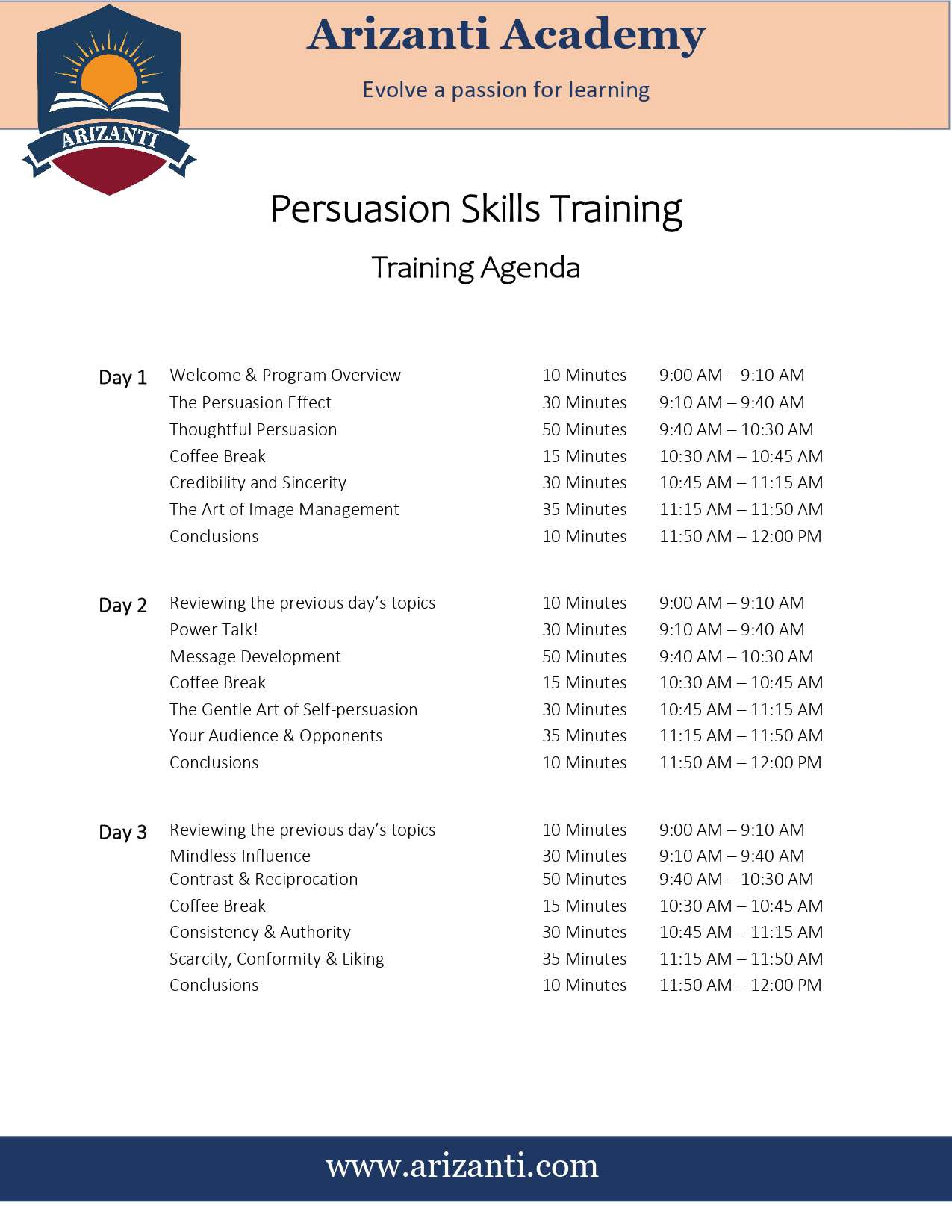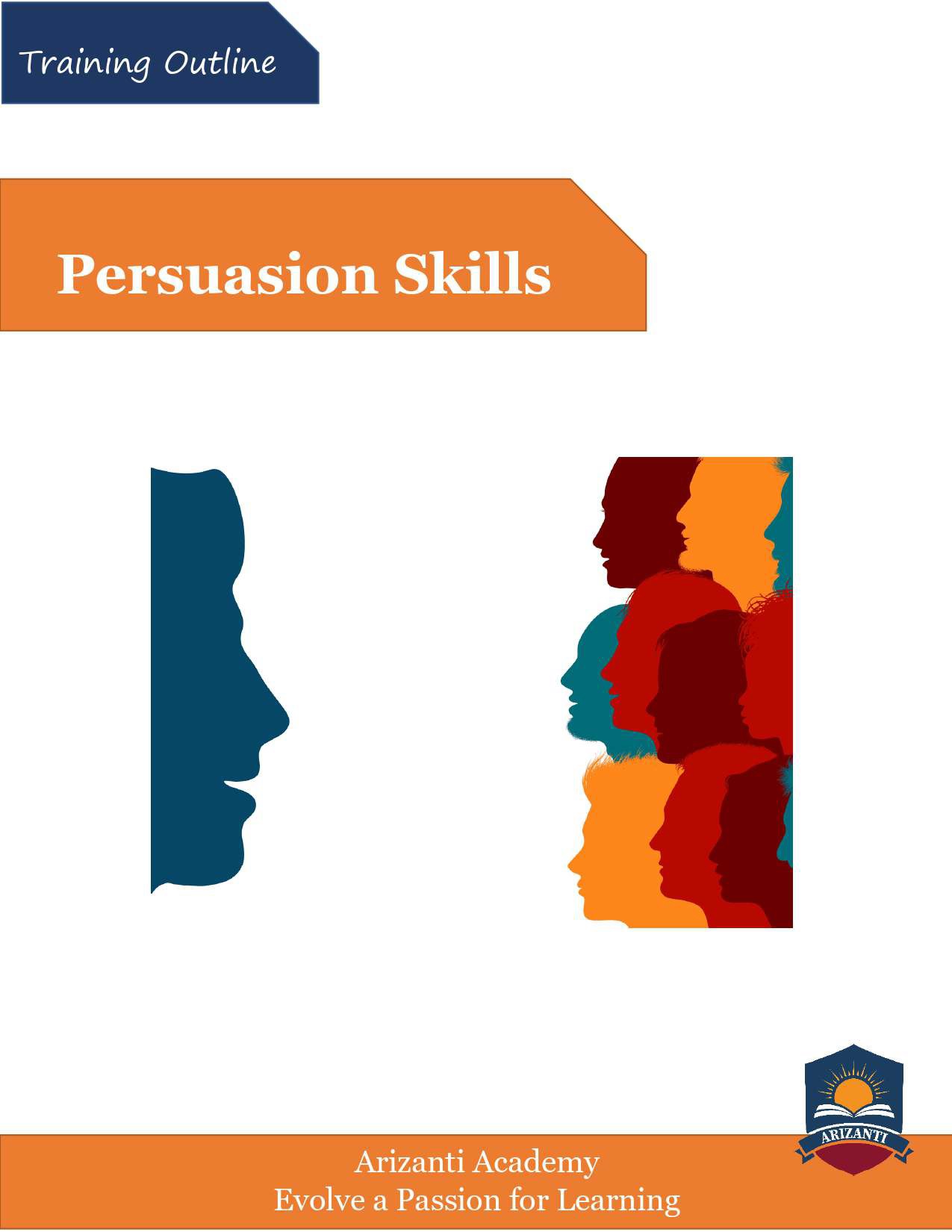By the end of this training, we expect the participants to have a deeper understanding of the importance of persuasion skills through:
- The process of persuasion and how a person makes decisions in his life.
- The difference between thoughtful persuasion, mindless influence (central and peripheral).
- How to achieve Thoughtful (central) persuasion.
- The role of appropriate message development in influencing others.
- Communicate your messages to others in an effective manner.
- How to achieve Mindless (peripheral) persuasion.
- The most important engines of mindless persuasion and how to trigger them.
Training Curriculum:
During the first day of the training, the participants will perform a self-assessment test to determine their knowledge and degree of mastering influencing and persuasion skills. This will help Identifying the aspects to be developed and the skills required to enhance their abilities to influence and persuade. Participants will learn about the concept of persuasion in general and the common patterns in the practice of persuasion and its implications for their personal goals. The first route of persuasion; Thoughtful (central) persuasion, and its most important elements and factors such as credibility and confidence building, and the importance of building a strong and influential self-image and the role of a vital first impression.
At the end of this day the trainees were able to have a better understanding of:- Self-assessment for influence and persuasion skills.
- The difference between manipulation, seduction and persuasion.
- Persuasion and how it works: Thoughtful and Mindless.
- The four patterns of influence.
- The three types of influencers.
- The importance of credibility and building trust in the persuasion process and how to achieve it.
- The art of image management.
During the second day, the power of talk in the process of persuasion will be presented through the use of metaphors, analogies, and stories, and thus how to develop the message that you want to convey to others in a way that ensures its full impact on them and winning their minds and hearts and motivate them take the decisions we want them to do. The question techniques and active listening methods will be elaborated to achieve this goal. How to target and influence different groups will be also addressed during this day through customizing the message and the delivery techniques according to the audience’s pattern.
At the end of this day the trainees were able to have a better understanding of:- Power of the talk and how to give words added impact.
- How to craft a powerful and impactful message.
- How to develop a Unique Selling Proposition (USP).
- The meaning of word manipulation?
- Methods of preparing and directing others for self-persuasion.
- How to target and influence different types of people.
- How of outsmart opponents and overcoming them.
During this day, the second route of influence and persuasion; Mindless (peripheral) persuasion, will be discussed. The participants will learn how people respond to messages addressed to him in a non-rational way and based on a set of internal thoughts and feelings. There will be an inclusive discussion for the intellectual programming of the human being and the automatic responses to the process of influence based on this programming will be recognized if he is exposed to certain stimuli. These motivators will be identified and how to use them to motivate people to take actions, by their own, aligned with our goals and needs.
At the end of this day the trainees were able to have a better understanding of:- What do we mean by Mindless (peripheral) persuasion?
- What is intellectual programming and how does it affect people’s response for influence?
- What are the persuasion triggers?
- How we take advantages of the persuasion triggers?
Who should attend?
This course is ideal and very important for every employee who has an administrative and leadership position that requires him to do work through others, and any employee who wants to influence customers and clients to persuade them to make decisions that serve their organizations. The program also serves anyone who has the desire to improve his personal skills to market himself and his ideas in an effective way to others.
A: Private training courses can be delivered in its location in (Villa No. R3/169, New Azadi-Atconz, Erbil/KRI) or outside venue booked by Arizanti Academy when there would be a need, or at your business premises.
Q: In which language the trainings are delivered?A: Our programs can be delivered in Kurdish, Arabic or English.
Q: What are your ideal training schedules?A: Half-day session: (09:00 am to 12:00 pm) or (2:00 pm to 5:00 pm) or to suit. Full-day session: (09:30 am to 15:30 pm) or to suit.
Our trainers are not only the most qualified professionally, but they are also the most capable of delivering information to the trainees. We rely on their selection, in addition to their high scientific specializations, on their experiences and personal abilities in implementing training programs of high value and positive returns, so that the training process does not become a mere waste of time and effort, but rather a real development of capabilities, skills and practical benefit acquired by our clients and their staff and practiced virtually to improve their overall performance.
In Arizanti Academy, we believe that accurate evaluation of training programs, based on scientific foundations and well-thought-out criteria, is the best way to achieve the desired goals of training, achieve maximum benefit from the program, and provide trainees with scientific knowledge, experience and practical skills. Therefore, we have built our evaluation systems based on accreditation and compatibility with a set of evaluation systems and international standards, where we rely in our work on: -
- Evaluation of the training program on the morning of the second day (if the program lasts for more than one day) to avoid any shortcomings in the program, and to achieve the objectives of the participants as groups and individuals.
- Participants' evaluation of the training material, the trainer, the place of training, training services and coordination on the last day of the program (this report is analyzed and the results are sent with the original evaluation sheets to the client with the final report).



